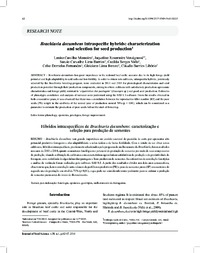Brachiaria decumbens intraspecific hybrids: characterization and selection for seed production.
Brachiaria decumbens intraspecific hybrids: characterization and selection for seed production.
Author(s): MONTEIRO, L. C.; VERZIGNASSI, J. R.; BARRIOS, S. C. L.; VALLE, C. B. do; FERNANDES, C. D.; BENTEO, G. L.; LIBÓRIO, C. B.
Summary: Brachiaria decumbens has great importance in the national beef cattle scenario due to its high forage yield potential and high adaptability to acid soils and low fertility. In order to obtain new cultivars, intraspecific hybrids, previously selected by the Brachiaria breeding program, were evaluated in 2013 and 2014 for phenological characteristics and seed production potential through their production components, aiming to obtain cultivars with satisfactory production agronomic characteristics and forage yield, resistant to ?cigarrinhas-das-pastagens? (Tomaspia sp.) and good seed production. Estimates of phenotypic correlation and analysis of variance were performed using the SAS 9.3 software. From the results obtained in both consecutive years, it was observed that there was a correlation between the reproductive tiller number (RT) and the pure seeds (PS) weight in the seedbeds of the second year of production around 70% (p < 0.01), which can be considered as a parameter to estimate the production of pure seeds before the start of flowering.
Publication year: 2016
Types of publication: Journal article
Unit: Embrapa Beef Cattle
Keywords: Apomixia, Apomixis, Fenologia, Forage improvement, Genotypes, Genótipo, Melhoramento de forrageira, Phenology
Observation
Some of Embrapa's publications are published as ePub files. To read them, use or download one of the following free software options to your computer or mobile device. Android: Google Play Books; IOS: iBooks; Windows and Linux: Calibre.
Access other publications
Access the Agricultural Research Database (BDPA) to consult Embrapa's full library collection and records.
Visit Embrapa Bookstore to purchase books and other publications sold by Embrapa.

